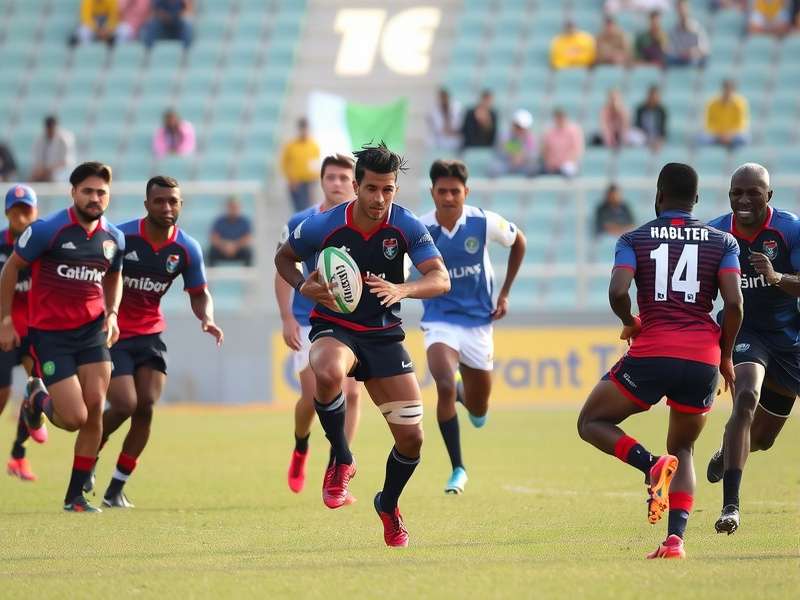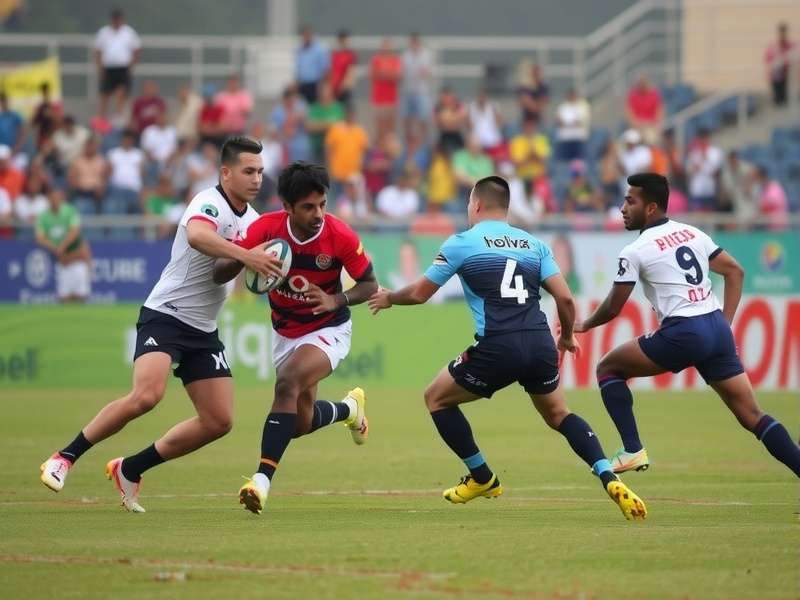Rugby Sevens India Tournament: Complete Guide
The Premier Rugby Sevens Competition in India - History, Teams, and Future Prospects
Overview of Rugby Sevens India Tournament

TheRugby Sevens India Tournamentrepresents the pinnacle of rugby sevens competition within the Indian subcontinent. This prestigious event brings together the finest rugby talent from across India and occasionally features international teams, creating a vibrant celebration of athleticism and sportsmanship.
Organized under the auspices of the Indian Rugby Football Union (IRFU), the tournament has grown significantly in stature and popularity since its inception. The fast-paced, high-scoring nature of rugby sevens makes it particularly appealing to new audiences, contributing to the sport's expanding footprint in a cricket-dominated landscape.
Tournament At A Glance
TheRugby Sevens India Tournamentfeatures 7 players per side (instead of 15 in traditional rugby), with matches consisting of two seven-minute halves. The condensed format creates non-stop action and requires exceptional fitness from participants.
What sets theRugby Sevens India Tournamentapart is its unique ability to blend international rugby standards with distinct Indian cultural elements. The tournament not only showcases elite athletic competition but also serves as a platform for promoting rugby at grassroots levels across the country.
History and Evolution
The origins of organized rugby in India date back to the British colonial era, but the specializedRugby Sevens India Tournamentis a more recent development. The modern iteration of the tournament emerged in the early 2000s as part of a strategic effort to popularize rugby sevens ahead of its reintroduction to the Olympic program.
First Edition
The inaugural tournament was held in 2006 with just 8 participating teams
Olympic Connection
Gained prominence after rugby sevens was added to 2016 Olympics
Growth
Now features 16+ teams including international participants
Key Historical Milestones
2006 - Inaugural Tournament
The first officialRugby Sevens India Tournamentwas held in Mumbai with eight teams competing. The Indian Army team emerged as the first champions, setting a high standard for competition.
2010 - International Participation
The tournament expanded to include teams from Sri Lanka and Bangladesh, marking its transition from a domestic to a regional competition and enhancing the level of play.
2014 - Women's Division Added
Recognizing the growing participation of women in rugby, the organizers introduced a women's division, which quickly became a highlight of the tournament.
2018 - Broadcast Partnership
A landmark television deal brought theRugby Sevens India Tournamentto national audiences, significantly increasing visibility and fan engagement.
2022 - Post-Pandemic Revival
After a two-year hiatus due to COVID-19, the tournament returned with enhanced safety protocols and record participation, signaling the robust health of Indian rugby.

Tournament Rules and Format
TheRugby Sevens India Tournamentfollows standard World Rugby laws for sevens with some adaptations for local conditions and development objectives. Understanding these rules is essential for both players and fans to fully appreciate the competition.
Match Duration:Each match consists of two seven-minute halves with a two-minute halftime. Knockout stage matches may extend to ten-minute halves.
Scoring System:Tries (5 points), conversions (2 points), penalty kicks (3 points), and drop goals (3 points) follow traditional rugby scoring with accelerated gameplay.
Tournament Structure
The competition typically begins with a group stage where teams are divided into pools of four. Each team plays every other team in their pool, with points awarded for wins (3 points), draws (2 points), and losses (0 points), with bonus points for close losses or high scoring.
Following the group stage, the top teams advance to knockout rounds including quarterfinals, semifinals, and the championship final. A separate plate competition is often organized for teams that don't advance from the group stage, ensuring maximum participation and competitive matches throughout the tournament.
Player Eligibility and Squad Rules
Teams are permitted to register up to 12 players for the tournament, with 7 starting and 5 substitutes. Unlimited substitutions are allowed, but players cannot return after being replaced except for blood injuries or head injury assessments.
For theRugby Sevens India Tournament, eligibility rules require Indian players to hold valid Indian passports, while international players are subject to specific quotas to maintain the developmental focus of the competition. This balance ensures competitive standards while prioritizing the growth of domestic talent.
Participating Teams and Rivalries
TheRugby Sevens India Tournamentbrings together a diverse array of teams representing various regions, institutions, and communities across India. This diversity creates a rich tapestry of playing styles and cultural expressions within the competition.

Notable Competing Teams
Indian Army Rugby Team
The most successful team in tournament history, known for exceptional discipline and fitness. Army teams have claimed the championship five times, establishing a legacy of excellence.
Delhi Hurricanes
Representing the national capital region, the Hurricanes feature a blend of university talent and experienced club players, renowned for their expansive attacking style.
Mumbai Seawolves
Hailing from India's financial capital, the Seawolves benefit from strong corporate sponsorship and access to international coaching expertise.
Himalayan Eagles
Representing northern hill stations where rugby has historical roots, the Eagles are known for their rugged forward play and exceptional kicking game suited to windy conditions.
Iconic Rivalries
Several compelling rivalries have developed over the history of theRugby Sevens India Tournament, adding dramatic narrative to the competition. The Army vs. Police matches represent a classic institutional rivalry, while regional contests between North and South Indian teams showcase different approaches to the game.
The introduction of international teams from neighboring countries has created cross-border rivalries that generate significant fan interest. Matches between Indian teams and sides from Sri Lanka or Bangladesh often draw the largest crowds and most intense media coverage.
Championship Records
Indian Army leads with 5 tournament victories, followed by Delhi Hurricanes with 3 titles. The most successful international team is the Sri Lanka Development XV with 2 championship wins in 2012 and 2015.
Future Prospects and Development
The future of theRugby Sevens India Tournamentappears bright, with strategic plans in place to expand its reach and elevate its status within both Indian sports and the international rugby community. Several key initiatives are shaping the tournament's trajectory.
Infrastructure Development
A major focus for tournament organizers is the development of dedicated rugby facilities across India. Currently, most matches are played on adapted cricket or soccer fields, but purpose-built rugby stadiums with appropriate dimensions and surfaces are in various stages of planning and construction.
The Indian Rugby Football Union has identified six cities for high-performance centers that will serve as hubs for talent identification and development. These centers will provide year-round training facilities and host qualifying tournaments for the mainRugby Sevens India Tournament.
Grassroots Expansion
Significant resources are being directed toward introducing rugby to new demographics and regions. School programs, university leagues, and community clubs are receiving support to establish sustainable pathways for player development.
Participation Growth:Youth participation in rugby has increased by 300% over the past decade, creating a larger talent pool for futureRugby Sevens India Tournamenteditions.
International Integration
Plans are underway to integrate theRugby Sevens India Tournamentinto larger Asian and global rugby circuits. Discussions with World Rugby about including the tournament as a leg in the developing Asia Sevens Series would significantly raise its profile.
There is also ambition to attract higher-profile international teams, potentially including developmental sides from traditional rugby powers like New Zealand, Australia, and South Africa. Such participation would dramatically improve the competitive standard and visibility of the tournament.
Commercial Development
As the tournament grows, so do its commercial prospects. Sponsorship revenue has increased steadily, with both domestic and international brands recognizing the value of associating with the event. Broadcast rights have become increasingly valuable as viewership numbers climb.
Merchandising, digital content, and experiential fan activations represent additional revenue streams that are being developed to ensure the long-term financial sustainability of theRugby Sevens India Tournament.
Vision 2030
The strategic plan aims to make theRugby Sevens India Tournamenta top-tier international competition by 2030, with participation from at least 24 teams including multiple world-ranked sides, and to establish India as a competitive rugby nation on the global stage.
Conclusion
TheRugby Sevens India Tournamentstands as a testament to the growth of rugby in a nation traditionally dominated by cricket. From humble beginnings, it has developed into a professionally organized competition that showcases athletic excellence while serving as a catalyst for the sport's development across India.
With its fast-paced, exciting format and commitment to both high performance and grassroots development, the tournament occupies a unique position in India's sporting landscape. As it continues to evolve and expand, theRugby Sevens India Tournamentpromises to play an increasingly important role in the global rugby ecosystem while inspiring new generations of Indian athletes.
The future trajectory of theRugby Sevens India Tournamentpoints toward greater international integration, improved infrastructure, and enhanced commercial viability. These developments will not only benefit the tournament itself but will also contribute significantly to the overall growth and professionalization of rugby throughout India.